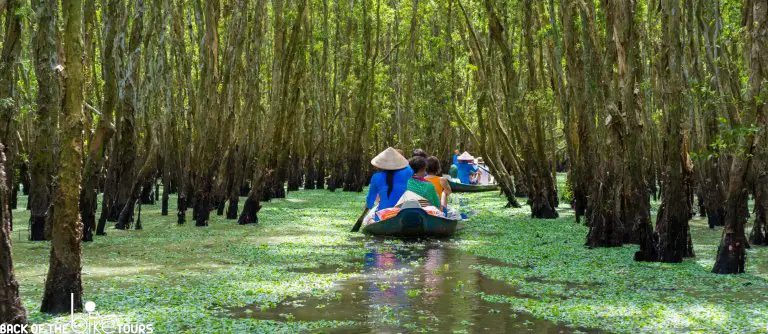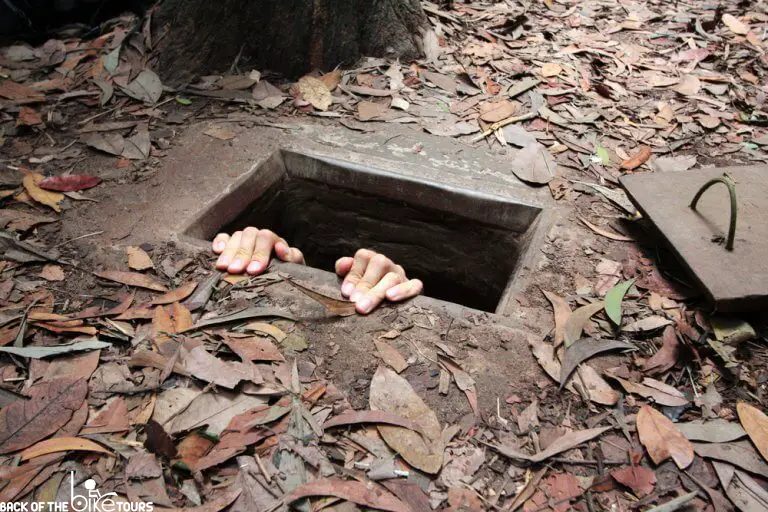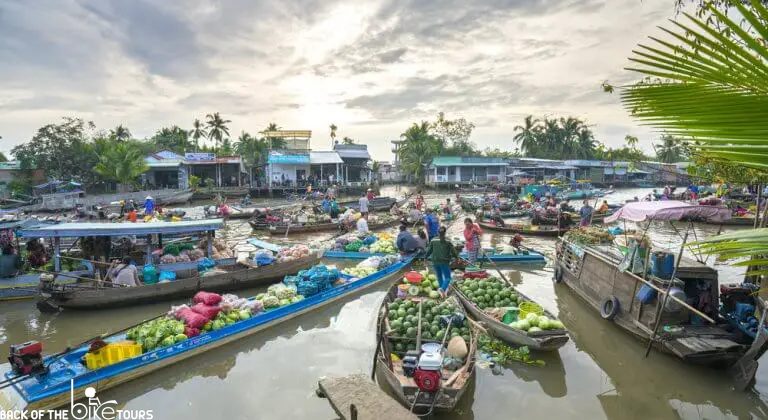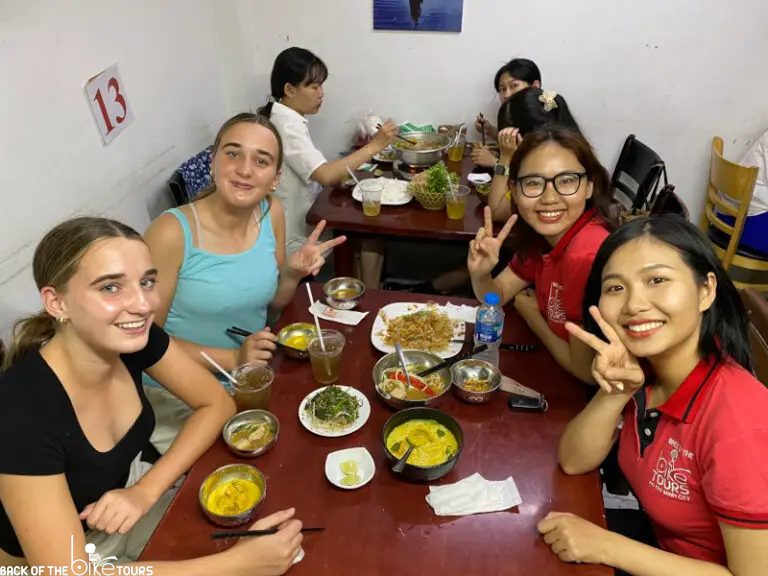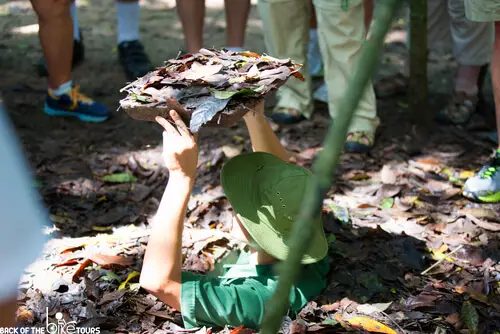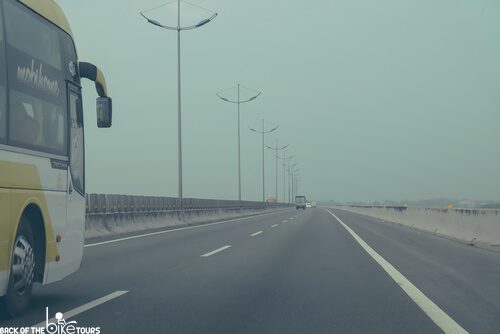What is a Food Tour?
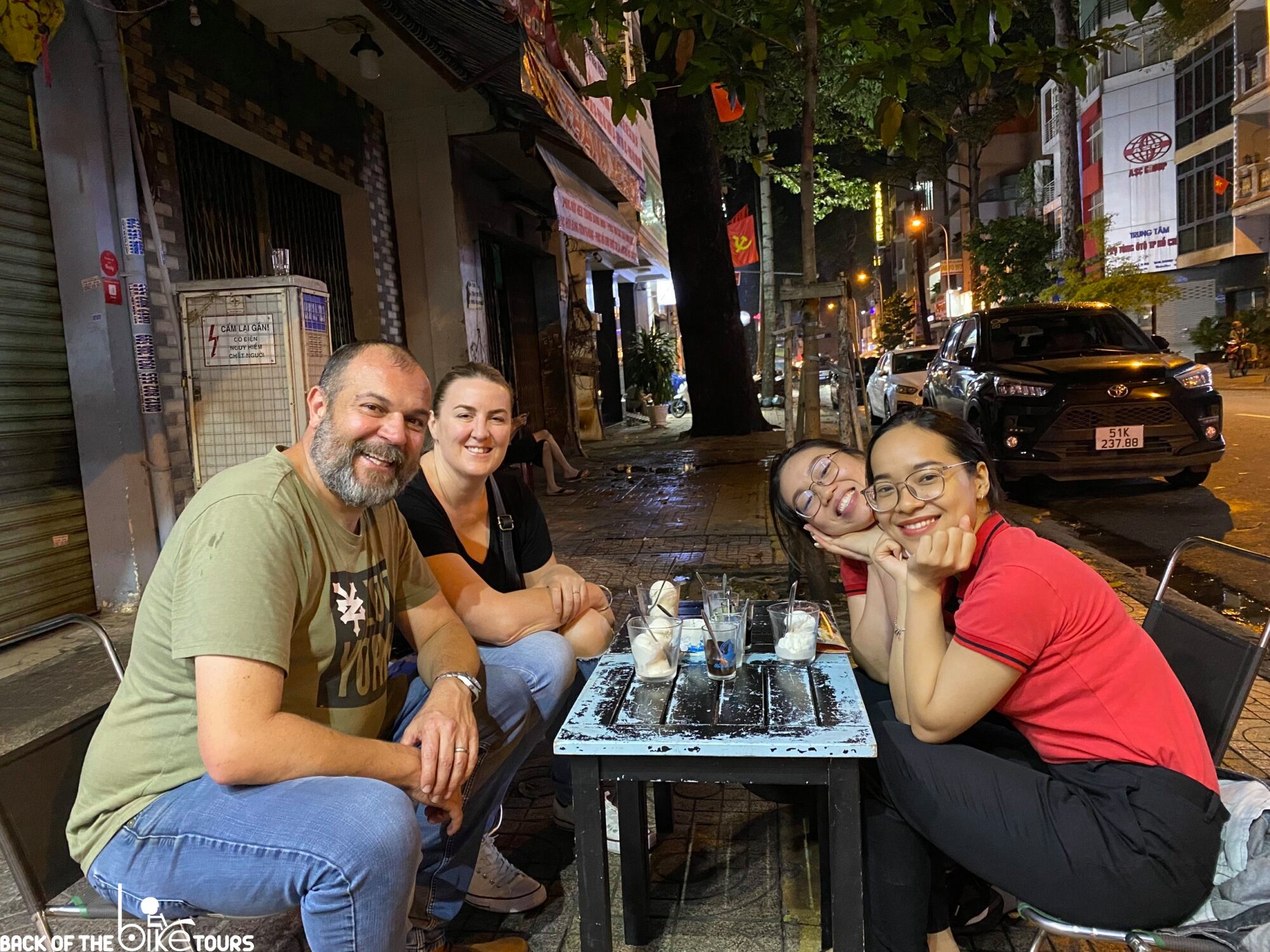
If you are unfamiliar with the food tour experience, you are in for a treat, literally and figuratively. You have probably been researching for an upcoming trip and keep stumbling across recommendations to give a food tour a try. Which begs the question, what is a food tour?
A food tour explores a city’s food culture through its cuisine. During the allotted time, you will try various dishes from different eateries, vendors, and/or restaurants. A food tour should help travelers gain an in-depth understanding of the city, country, or community’s culture through their cuisine. A food tour will usually be operated by a local guide or sometimes through a guidebook.
I have been operating food tours in Ho Chi Minh City for over a decade, and of course, my opinion is biased, but I think a food tour is an excellent way to get in touch with a location and its people. It’s also an excellent career path or company for those in the hospitality industry looking to get out of the kitchen and show off the food they love! So, What is a food tour?
So today, in this article, I’ll explore a general yet defined picture of what food tours are and the type of things you look out for when you book one. I have experience operating but also taking food tours, and I’ll do my best to share insights.
What is a Food Tour, and Why Should I Book it?
To simplify it, a food tour is a tourism service that focuses on food! Unlike other types of tourism, food tours do not focus on scenery or popular locations. Rather, the main purpose of food tours is for participants to understand and appreciate culture and its people via the food it offers. Therefore, food tours’ asset lies in the opportunities to see and experience culture up close.
I’ll give an example of how we operate our food tours. We operate our tour through motorbikes, allowing us to venture through much of the city. On the food tour, I try to connect our food locations with a story that connects our customers to the person selling the food. Also, each of our customers gets a guide, so during a 4-hour tour, our customers have enough time to engage with a real, local Vietnamese person who speaks English.
This is how we connect travelers to Vietnamese culture. Eating tasty food around the city is just the delivery device for travelers to build a real connection with Vietnam’s culture and people. I speak more in-depth about this in my article about why you should take a food tour in Ho Chi Minh City.
Food Tour Operators will do the same if you have booked a good food tour. Sometimes it’s done through stories while walking through a city or neighborhood, meeting the individual vendors, or hearing stories from a local guide’s own perspective and experience.
What to Expect on a Food Tour?
The typical food tour is usually operated by a local walking you through a heaven of amazingly inspiring local cuisine. For example, you might meet a nice grandma cooking in the comfort of her home, introducing you to her wonderfully hearty food, and telling you how that food came to the table before you. On the flip side, you could meet a new restaurant owner who has created a completely new dish in the city. Hearing that owner’s story and experiencing their food will help you connect with the place you have traveled.
Hopefully, You’ll get to try unique, local food, meet the people who devote their whole lives to perfecting the dish, and learn culture and history through talking with them and your guide! I can’t speak to every food tour and how they operate.
The mode of transportation might differ on each food tour. For example, I do motorbikes on my tours and I got to take a Tuk Tuk tour in Bangkok!
The most common food tour though is the walking food tour. It can be a walk through the local market to learn about the country’s common ingredients before tasting something cooked with those ingredients near the market. Or learning about a neighborhood as you walk through it, and then trying one of the oldest eateries in that area.
What Kind of Food Can You Eat on a Food Tour?
The kind of food you will get to try on a food tour depends on the location and types of food tours you choose. The food can vary in a wide range of price, grade, and category. Nevertheless, they all share these common “ingredients”: Tasty, Local, and Cultural! These are the qualities to judge any food tour; any food tour on Earth will have to pass these qualifications.
Oftentimes times food tour companies offer a variety of tour options centered around a cuisine. In our case, I have an afternoon food tour that focuses on small vendors and eateries which is a very local feeling. While at night, our Taste of Vietnam will visit more comfortable local restaurants and I place the focus on serving unique food that is not only new to them but delicious.
How long does it take?
Food tours rarely last more than a day. You can’t keep eating for that long! They are often organized in the morning or late evening as “hangry” is the main emotion of most people at these times of the day.
A food tour can average from 3-4 hours, counting commuting time. There are, of course, many variables in what kind of food tour you want to book. A food tour that introduces a specific theme, such as a French wine or a Korean fish market walk, would most likely take less time than food tours that introduce the cuisine of an entire city, for instance.
If a food tour includes a cooking workshop, it’d usually be arranged after the tasting tour and before your main meal because both activities will surely work up your appetite by then.
Can I go on a food tour if I have allergies and/or food restrictions?
This is probably the most common question when considering a food tour. This depends entirely on the tour operator. Sometimes its not really possible to cater to allergies so you should be clear with your operator before booking on what your specific requirements are.
After all, food is the most worrisome aspect when it comes to a new environment, not to mention a culinary learning experience where you have to try many new things. However, some tours would advocate against customers who have life-threatening allergies. As allergies and food restrictions are not rare, most experienced tour guides will understand that they must be taken seriously and considered in the tour’s organization.
So, whatever dietitian inquiries you have, be it veganism or even mild allergies, don’t be afraid to inform your tour guide and/or the booking company. It is best to inform them a few days before so that they can customize and prepare the tour most fitting to your needs. Ultimately, the tour guides themselves should be most wary about and responsible for your satisfaction.
Who is suitable for a food tour?
Food tours are for anyone and everyone. The discovery of food and culture should be accessible and enjoyable for everyone. Of course, if you are one of the rare people who just generally doesn’t like food, it might not be for you. But, I’m sure you can find something enjoyable from the experience still.
If you’re older or less adventurous, especially with food, a food tour might open you up to a culinary adventure you didn’t know you could enjoy!
Families are even more suitable as parents normally have positive feedback about food tours. First, a contemporary culinary experience will surely bring everyone in the family closer. But on an even more promising note, some parents said that their children, although very picky at home, have tried many new flavors and food on the trip! Such success possibly owes to curiosity and increased appetite after walking or cooking.
Larger groups might wonder if they will “fit” on a food tour. 100 people traveling in a flock does seem like a lot, and eating needs to be very intimate. Smaller groups are indeed preferred in food tours as these tours usually take tourists to smaller, local restaurants or stands. Thus, seats are limited, and the experience can be overwhelming for guides and tourists when an item needs to be introduced and distributed to 100 people. Nevertheless, it depends on the organizers. Some guides might recommend that you separate into two or more groups; if your group is overcrowded, you can do separate tours of separate locations.
In a nutshell, anyone can go on a food tour and enjoy it if they have the will, and while at it, discussing with your booking company ahead of time is always a highly recommended preventive measure.
When should I go on a food tour?
Most travel agencies recommend food tours for the beginning of your trip. There are many reasons for this advice. Firstly, food tours are usually organized so that you get both a general view of the place and its culture. Thus, it can introduce many impressive destinations and shops that you might want to return to later in your trip. Secondly, on the same principle, since you are introduced to many good foods and places to eat on your first day, you will know what to expect and where to get the same great experience for the rest of your trip. Thirdly, another aspect of organized and food tours specifically acquaint one with fellow travelers. Eating is intimate, exploring, and sometimes emotional; therefore, it is one of the greatest tools to make friends – companions that might accompany you on the next adventures.
What Should I Bring on a Food Tour?
If the tour covers all the food and transportation, Should you bring any extra cash? Firstly, similarly to many service businesses, tipping might be the norm. Be that as it may, it’s better to bring a little cash rather than wave an awkward, empty goodbye at your enthusiastic tour guide. You would be surprised at how many people I have contacted me after a tour asking to send me money online to tip their driver after one of our tours.
Secondly, another unexpected yet expected facade is “amazingly good food you want to take home”. While on a food tour, try not to be in that situation where you’ve tasted something life-changing – a taste that you want to share with the whole world, to write about in your journal, something that you think about the rest of your trip – but you cannot try it again or bring it home to friends and family because… you forgot your wallet at the hotel! So pocket some cash in case any of these crisis occurs to you on your food tour.
In this era of “Instagrammy”, you can’t forget your camera/phone on a food tour! On another note, remember that food tours take you through the whole region or somewhere interesting, so the pictures taken on a food tour are most likely around 100 times more interesting than the ones taken at the most popular tourist attraction in town!
Pace yourself on Food Tours
This is probably the most difficult advice to follow and hardest for me to regulate as a food tour operator.
From my experience, the best way to enjoy a food tour is to pace yourself. Don’t eat too much of the first thing you’re introduced to. It will significantly reduce the risk of I’m-too-full-and-I-can’t eat-anymore-syndrome, which would be bad if you see some better treats along the way. This is especially important if your food tour includes a bigger lunch or dinner at the end. Trust me, you don’t want to miss out on the most expensive thing on the menu!
Come Hungry
This is also another common question of food tour participants. If your tour is in the morning or before the main meal, you should skip this meal or eat a lighter one. After all, it is a food tour, and you will be fed. Although one bite at a time doesn’t seem much, accumulated over time, the portion could easily replace a full meal.
However, many food tours don’t feed their clients after a few hours, so if you have problems relating to blood pressure or other medical issues and cannot stand hunger, I suggest you follow our next reminder.
Be informed
I can’t stress enough how important this is, for any tourists on any tours, not only food tours. If you have an especially deadly allergy or a dish you want to try that’s not in the curriculum, you must inform your guide at least 24 hours before so that they can take care of it best.
If you go on a tour, not just a food tour, read and research the itinerary carefully. Contact the tour operators before and even after booking for any questions. Do remind yourself that it’s organized, but it’s also the trip you booked and paid for, so your satisfaction and safety are as much your responsibility as theirs. The most complete and fun trip is, in a nutshell, without medical emergencies or arguments with your tour guide.
Any final reminders? Be curious, be open, and have fun. This kind of tour might be new for you, and some cuisine can be strange, scary, and sometimes, seemingly unethical. Nevertheless, remind yourself one thing: the point of the trip is to have fun and learn. Someone said, “When you go out of your comfort zone, and it works, there’s nothing more satisfying.” That is the spirit of a food tour, and hopefully, what you and your companions will get out of it!

